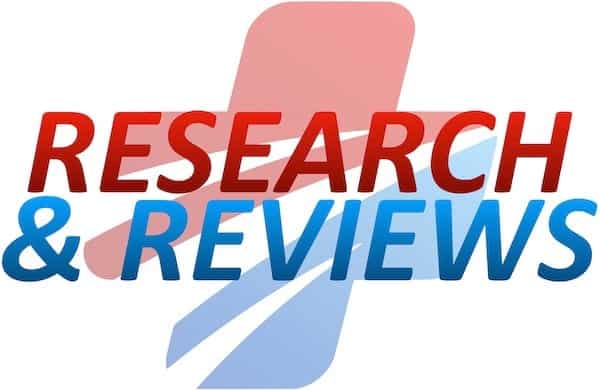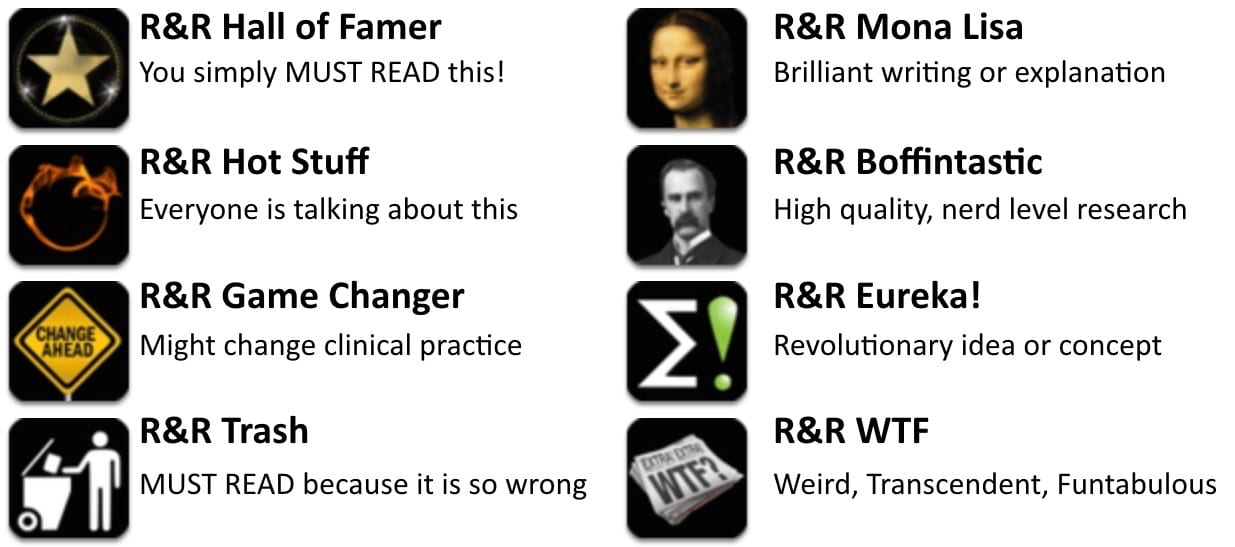R&R In The FASTLANE 010
Welcome to the 10th edition of Research and Reviews in the Fastlane. R&R in the Fastlane is a free resource that harnesses the power of social media to allow some of the best and brightest emergency medicine and critical care clinicians from all over the world tell us what they think is worth reading from the published literature.
This edition contains 10 recommended reads. The R&R Editorial Team includes Jeremy Fried, Nudrat Rashid, Soren Rudolph, Anand Swaminathan and, of course, Chris Nickson. Find more R&R in the Fastlane reviews in the : Overview; Archives and Contributors
This Edition’s R&R Hall of Famer
Isbister GK, Calver LA, Page CB, Stokes B, Bryant JL, Downes MA. Randomized controlled trial of intramuscular droperidol versus midazolam for violence and acute behavioral disturbance: the DORM study. Ann Emerg Med. 2010 Oct;56(4):392-401.e1. PMID: 20868907
- The DORM study is an important step towards rehabilitating the reputation of droperidol in the sedation of agitated patients. Droperidol is an (almost) essential emergency drug that we should not be afraid to use when required.
- Recommended by: Chris Nickson
Solomon RC. Coffers brimming, ethically bankrupt. Ann Emerg Med. 2012 Feb;59(2):101-2. Epub 2011 Nov 10. PMID: 22078890.
- A brilliantly written piece outlining our culpability as physicians and our responsibility to make a stand and pay the moral and financial cost of our involvement with big pharma.
- Recommended by: Andy Neill
Machi MS, Staum M, Callaway CW, Moore C, Jeong K, Suyama J, Patterson PD, Hostler D. The relationship between shift work, sleep, and cognition in career emergency physicians. Acad Emerg Med. 2012 Jan;19(1):85-91. doi:10.1111/j.1553-2712.2011.01254.x. Epub 2012 Jan 5. PMID: 22221346.
- While I have no doubt that being tired contributes to mistakes I suspect this study is testing the wrong thing and misses the fact that when we need to cope we probably do
- Recommended by: Andy Neill
Casaer MP, Mesotten D, Hermans G, Wouters PJ, Schetz M, Meyfroidt G, Van Cromphaut S, Ingels C, Meersseman P, Muller J, Vlasselaers D, Debaveye Y, Desmet L, Dubois J, Van Assche A, Vanderheyden S, Wilmer A, Van den Berghe G. Early versus late parenteral nutrition in critically ill adults. N Engl J Med. 2011 Aug 11;365(6):506-17. Epub 2011 Jun 29. PMID: 21714640 – [Fulltext]
- EPaNIC trial (MC-PrRCT) If you parenterally feed a critically ill patient who is already being enterally fed; they get out of ICU alive a tiny bit earlier, endure 2 days less of ventilation and have fewer infections if you start the PN after 8 days rather than within 48hrs… Um…OK! But shouldn’t most of your patients be out of the ICU by then anyway? Especially if they are mostly cardiac surgery patients! (Survivor treatment bias!!!)
- Recommended by: Matthew Mac Partlin
Allgaier R, Vallabh K, Lahri S. Scurvy: A difficult diagnosis with a simple cure. African Journal of Emergency Medicine (2012): Article in Press – [Fulltext]
- “The life of a pirate wasn’t always full of adventure and partying”
- … A forgotten disease?
- Recommended by: Sa’ad Lahri and Chris Nickson
Klotz L. How (not) to communicate new scientific information: a memoir of the famous Brindley lecture. BJU Int. 2005 Nov;96(7):956-7. PMID: 16225508 – [Fulltext]
- At once unbelievable, horrifying and a lesson in how to give a talk that no one will ever forget. Left me speechless.
- Recommended by: Chris Nickson
- Learn more: LITFL – How to give an unforgettable talk.
Marks V. Murder by insulin: suspected, purported and proven — a review. Drug Test Anal 2009 Apr;1:162-76. PMID: 20355194
- With the recent series of suspicious hypoglycemic deaths at Stepping Hill Hospital in Greater Manchester (U.K.), this paper takes on added interest. It summarizes 66 cases of known or suspected insulin poisoning, and makes some important points about the forensic issues involved.
- Recommended by: Leon Gussow
Young PJ, Saxena M, Beasley R, Bellomo R, Bailey M, Pilcher D, Finfer S, Harrison D, Myburgh J, Rowan K. Early peak temperature and mortality in critically ill patients with or without infection. Intensive Care Med. 2012 Jan 31. [Epub ahead of print] PMID: 22290072.
- Hot of the press (pun intended). Early fever is associated with improved outcomes in critically ill patients with infection but with worsened outcomes in those without infection. These data provide the basis for the hypothesis that administration of paracetamol to critically ill patients with fever and infection worsens outcome.
- This hypothesis is being tested in the HEAT trial
- Recommended by: Paul Young
Rosenberg H, Al-Rajhi K. ED ultrasound diagnosis of a type B aortic dissection using the suprasternal view. Am J Emerg Med. 2012 Jan 11. [Epub ahead of print] PMID: 22244228.
- Great case report of type B aortic dissection diagnosed on bedside ED ultrasound.
- Recommended by: Leon Gussow
James MF, Michell WL, Joubert IA, Nicol AJ, Navsaria PH, Gillespie RS. Resuscitation with hydroxyethyl starch improves renal function and lactate clearance in penetrating trauma in a randomized controlled study: the FIRST trial (Fluids in Resuscitation of Severe Trauma). Br J Anaesth. 2011 Nov;107(5):693-702. Epub 2011 Aug 19. PMID: 21857015.
- Cliff Reid saw this paper first but it’s worth reading yourself. Conclusions say colloids better for resus. Actual results say quite the opposite. Great paper to read on obfuscation of a key issue.
- Recommended by: Andy Neill
- Learn more: Emergency Medicine Ireland – Colloids for Resus in Trauma
Chris is an Intensivist and ECMO specialist at The Alfred ICU, where he is Deputy Director (Education). He is a Clinical Adjunct Associate Professor at Monash University, the Lead for the Clinician Educator Incubator programme, and a CICM First Part Examiner.
He is an internationally recognised Clinician Educator with a passion for helping clinicians learn and for improving the clinical performance of individuals and collectives. He was one of the founders of the FOAM movement (Free Open-Access Medical education) has been recognised for his contributions to education with awards from ANZICS, ANZAHPE, and ACEM.
His one great achievement is being the father of three amazing children.
On Bluesky, he is @precordialthump.bsky.social and on the site that Elon has screwed up, he is @precordialthump.
| INTENSIVE | RAGE | Resuscitology | SMACC








